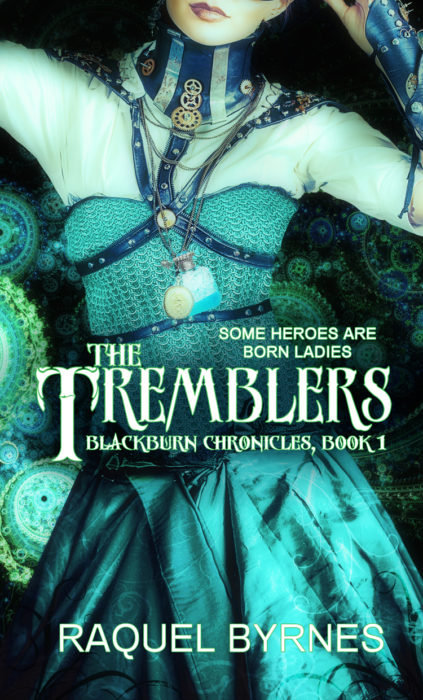Fantasy is the Most Eternally Realistic Kind of Story
Is fantasy merely escapism, or is something more profound woven into those tales?
Fantasy fiction whisks away readers to worlds filled with the strange, the ethereal, the alien. They conjure images of chosen warriors and dark armies fighting against nebulous powers.
These stories would seem to point one away from biblical truth, or at the very least distract from it.
However, I argue that fantasy does the opposite.
Raquel Byrnes (author of The Tremblers) is this week’s featured novelist in Lorehaven Book Clubs. Stop by the flagship book club on Facebook to learn more about this post-apocalyptic steampunk thriller. You can also join our ongoing book club selection this month, reading through James L. Rubart’s novel The Man He Never Was.
When we read fantasy, we begin a journey filled with trials and pitfalls that mirror our own struggles in living a faithful life. We see echoes of our own battles in fantasy. And so, we learn we are not alone.
One of the strengths of fantasy is that it is so hyperbolized. Everything is ratcheted up to a life or death level. The contrast, very often, between good and evil is stark and the results of turning toward good or toward evil are world-altering. The battles are usually not only for kingdoms, but sometimes even existence. Fantasy is a deeply symbolic form of storytelling that often brings to the forefront the ideas behind the symbols themselves; a tablet cracked, a throne restored, a crown that weighs heavy. And we realize our decisions have consequences.
 In fantasy, we explore themes like stepping out in faith despite feeling woefully unprepared or equipped. Whether you’re a mother or a hobbit, we all experience fear at some point in our lives. Or perhaps it is the fight against enticement, whether it is power, lust, or even Turkish delight, that we identify with. When both the powerful and the simple were tempted in Tolkien’s tales did that not also warn us all that no one is immune? And so, we learn mercy.
In fantasy, we explore themes like stepping out in faith despite feeling woefully unprepared or equipped. Whether you’re a mother or a hobbit, we all experience fear at some point in our lives. Or perhaps it is the fight against enticement, whether it is power, lust, or even Turkish delight, that we identify with. When both the powerful and the simple were tempted in Tolkien’s tales did that not also warn us all that no one is immune? And so, we learn mercy.
The wandering hero is often found in this genre and strikes a chord with anyone who has felt alone in their own walk of faith or who have cried out and heard echoes in return. Yet there is always, however long it may take, an answer. We see we are not truly lost.
Through fantasy, we can explore the real consequences of deviating from the course laid out for us and trusting only in our own knowledge. A hero who insists on his own path out of pride or arrogance soon learns that humility can be as powerful as brawn. And though we may not face the literal fiery breath of a dragon, the beasts of sin are on the constant prowl for us. And so, we learn the value of wisdom.
Perhaps it is fantasy’s fascination with connections to something greater, whether it is a power to defeat evil or discernment to stop a war. Maybe it’s the strength to be just which draws us to those stories. It is through fantasy that we can struggle with profound questions about our own human condition. And it is where we can explore ideas of honor in the face of tyranny, courage despite almost guaranteed failure, giving oneself over to something larger than yourself, and fulfilling a calling that will define your life.
Redemption is one of the staple themes in fantasy where heroes are often battle worn and world weary. Where the baser aspects of human existence have left scars. We have stories where heroes are lost in who they are, paralyzed with anger, or crumbling under the mantle of expectations. And yet fantasy is a genre of hope. A chance to right wrongs. That is truly a Christian sentiment. We see it time and again in the Bible. Jesus forgiving a denier, God blessing a couple with a child, or the restoration of a people. Fantasy can point us to grace.
Symbolic and prophetic, these are the tales that teach us about strength and sacrifice. We walk with often deeply flawed characters through failure, consequences, and ultimately, we hope, their redemption. Fantasy takes us through depths of struggle, when it truly does cost dearly to stay the course. We see that faith is not always pretty. We see that it is often not easy. But fantasy shows us more. It shows us that it is worth it.
“Anna Tan creates a beautiful multicultural world for Dongeng. . . . Danger and hope, fear and joy all come to life in this thoroughly fun adventure.”
— Lorehaven MagazineExplore Anna Tan’s newest novel Dongeng in the Lorehaven Library.
Read our full review exclusively from the spring 2018 issue of Lorehaven Magazine!





























Share your fantastical thoughts.